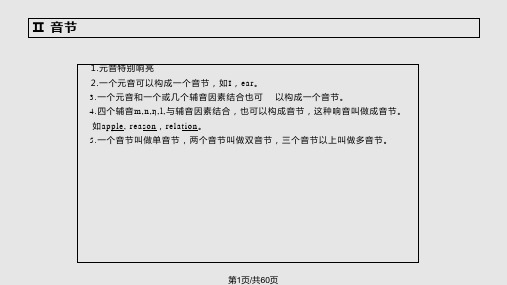高中英语 句子的重音和语调 课件
合集下载
英语句子的重音和升降调详解

6
冠词一般都不重读
He 'lives in a 'house 'not 'far from the 'school It's an 'hour’s 'drive from the 'old 'station The 'man 'over there is my 'brother An 'elephant is an 'animal
16
介词在句首时常可重读
'On his 'way 'home he 'met an 'old 'friend 'In the 'room they 'found a 'little 'boy 'Under the 'tree 'stands a 'tall man
17
连接词 单一的并列连接词包括关联连接词both … and neither…nor等和从属连词都不重读
介词 单音节介词一般都不重读
'All but 'one of the 'family are at 'home 'How 'far is it from 'Paris to 'London 'What are you 'looking at 'That’s what I was 'thinking of
但在双重所有格中;物主代词往往不重读
I’m 'writing to a 'friend of mine
3 强调代词
冠词一般都不重读
He 'lives in a 'house 'not 'far from the 'school It's an 'hour’s 'drive from the 'old 'station The 'man 'over there is my 'brother An 'elephant is an 'animal
16
介词在句首时常可重读
'On his 'way 'home he 'met an 'old 'friend 'In the 'room they 'found a 'little 'boy 'Under the 'tree 'stands a 'tall man
17
连接词 单一的并列连接词包括关联连接词both … and neither…nor等和从属连词都不重读
介词 单音节介词一般都不重读
'All but 'one of the 'family are at 'home 'How 'far is it from 'Paris to 'London 'What are you 'looking at 'That’s what I was 'thinking of
但在双重所有格中;物主代词往往不重读
I’m 'writing to a 'friend of mine
3 强调代词
英语的重音、语调、声调及其

声调(tone)
• 虽然英语是重音节奏语言,人们也可以在 单音节词汇上使用不同的声调,即音高变 化。
• nō nó nǒ nò no 的词义不会直接发生改变,当然,不同 的调型自身会有不同的话语含义,但只是 间接意义,隐含意义。——《英语重音动 态研究》徐曦明 上海交通大学出版社 P204
语调(Intonation)
• When pitch, stress and length are tied to the sentence ,they are known as intonation.
• 语调与声调的关系: “ 就是你拿字调(声调)跟语调比小波和大波。 大浪在那儿起伏,每一个浪头上仍旧可以有小浪 儿。所以字调在语调上就仿佛小波在大波上似的 都可以并存的。”(赵元任 1980:94)
诗歌欣赏(Iambic tetrameter)
• Shall I│compare│ thee to │a sum│mer’s day? ( a) Thou art │more love│ly and │more tem│perate -: ( b) Rough winds │do shake │the dar│ling buds │of May, (a) And sum│mer’s lease│ hath all │too short│ a date: (b)
重音的意义功能
• 一、单词
• a.重音换位,词性改变,意义相同
•动
名
con‘flict
‘conflict
斗争
in‘sult
’insult
侮辱
fre‘quent
’frequent
频繁
• b 意义微妙变化
•动
名
英语句子重音、语调、连读、弱读、爆破及意群 教学PPT

• He ‘isn’t a tech ‘nician.
• 3. be用在一般疑问句句首时,重读与否均可: • ‘Is he a ‘worker? • Is he a ‘worker?
• 比较句中的重音 • 在比较句中,重音落在as或than后的代(名)词上: • This is better than ‘that. • John is taller than ‘Bill. • She’s as happy as a ‘lark. • He’s as sly as a ‘fox.
• You were trying, ‘weren’t you? Yes, I ‘was.
• 2. 助动词、情态动词和be动词与not连成一词时要重读:
• She ‘doesn’t ‘like the ‘weather here.
• I ‘can’t ‘speak ‘French。
• They ‘aren’t ‘waiting for us.
Note
如果前词尾辅音与后词尾辅音相同,前辅
音省略。
I was× so happy. I have got× to go. →I have gotta go.(to轻音化为ta) Do~you want× to dance? →do you wanna dance?
(to轻音化为na)
Note
以辅音结尾的单词 + h开头的单词,h不发
in an hour pick it up an hour and a half let him in
A group of people put on their coats and went out.
2.“辅音+半元音”
i. 英语语音中的/j/和/w/是半元音,如果前一个词是 以辅音结尾,后一个词是以半元音,特别是/j/开头, 此时也要连读。
高中英语语音语调怎样学PPT课件

[ u] 合口双元音
先发 [ ]音,然后滑向[ u ] 音; 发音过程中,下颚稍抬高,双唇由扁 平收圆; 发音前长后短,前重后轻; 发音时声带振动。
[ u] 练习下面的句子
No smoking. I can row a boat. I’ll show you some coats. I got a low-interest loan.
[ ] 前元音
舌尖抵下齿,舌前部向上腭抬起, 比[ : ]发音时略低;
双唇仍呈扁平口形,比[ : ]要稍 大;
发音时声带振动,发音时间比 [ : ]短促。
[ ]练习下面的句子
Miss Betty is a pretty lady. What a big pity! The dish of fish is delicious. Marry can copy the file. It’s a crime to pick a pocket.
[ :] 后元音
口张大,舌尖压低并后缩,舌尖不 抵触下齿;
舌后稍抬起,双唇微收圆; 发音时声带振动
[ :] 练习下面的句子
A car is passing by the parks. My heart is beating hard. He’ll start for the party soon. They are playing cards. Your remarks are far afield.
[u:] 后元音
舌尖离开下齿,舌后部向软腭抬起,
比[u]发音时略高; 双唇收得比[u] 更圆更小且向前突
出; 口腔肌肉始终保持紧张状态; 发音时声带振动。
[u:] 练习下面的句子
I’ll clean my room soon. It’s cool in autumn. Have some fruit, please. The moon rises at night. The sky was blue and clear.
英语音节划分-重读规则-读音规则课件

英语音节划分-重读规则-读音规则课件重音一、单词重音1.双音节词a) 一般在第一个音节重读。
letter, sorryb) 有a-, be-, de-, re-, res-, in-, im-, en-, em-, es-, ex-, con-, com-, dis-, mis-, pre-, per-, pro-, trans- 等前缀的词,第二个音节是重音。
a'bout, be'lieve, ad'dress, de'cide, re'port, con'demn, res'pect, com'pare, in'form, dis'cuss, im'press, mis'take, en'force, pre'pare, em'ploy, per'mit, es'cape, pro'duce, ex'claim, trans'latec) 有de-, in-, re-, con-, pre- 等前缀的重音与词义和词类有关, 一般名词的重音在第一个音节上,其它的词性在第二个音节上。
'record, re'cord; 'insult, in'sult; 'conduct, con'duct; 'present pre'sent; 'content, con'tentd) 有些复合词和带有前缀re-, ex-, un-, pre-, post-, 等的词,有两个重音。
'out'side, 're'tell, 'well-'known, 'un'real, 'fif'teen, 'Chi'nese, 'pre-'war,'post-'war2.多音节词a) 一般倒数第三个音节是重音。
英语的语音和语调PPT课件

第30页/共60页
1)Is ↗John in? No, John’s ↘not in.
降调:回答问题。 2) Is ↗John in?
No, ↘John’s ↗not in. 降升调:回答问题且有言外之意。如: John’s not in,but his wife/sister/brother is.
第36页/共60页
第37页/共60页
1、/i:/ /I/ /p/ /b/ / t/ /d/
/i:/ 长元音,嘴唇微微张开,舌尖抵下齿,嘴角向两
边张开,流露出微笑表情,与E发音相同。 eg: pea(豌豆), bee(蜜蜂),eat
(吃),beat(敲打),deep(深的) /I/ 短元音,嘴唇微微张开,舌尖抵下齿,舌前部抬
/i:/,i读作/ai/,o读作/əu/ ,u 读作/ju:/ 或/u:/
第2页/共60页
闭音节
元音字母后面有辅音字母(r除外)时,这个源自元音字母构成的音节叫做闭音节。
cat set bit hot cut
inset
在闭音节中,元音字母 a读作/æ/, e读作/e/,i 读 作/i/,o读作/ɔ/, u读作/ʌ/或/u/
•
如:next year, did you
• (5) r音连读。前面单词第以9页元/共音60/页ə/ 或/ɜ:/ 结尾,后面单词以元音
(二)弱读
元音弱读时一般发为 /ə/ /ɪ/
• 常见单词弱读: and--/n/ /ən/ /æn/
is--/z//s/
or--/ər/ till--/tl/
would--/əd//d/
第23页/共60页
Ⅵ 语调
• 英语语调主要有降调、升调和降升调(或升降调)三大类。
1)Is ↗John in? No, John’s ↘not in.
降调:回答问题。 2) Is ↗John in?
No, ↘John’s ↗not in. 降升调:回答问题且有言外之意。如: John’s not in,but his wife/sister/brother is.
第36页/共60页
第37页/共60页
1、/i:/ /I/ /p/ /b/ / t/ /d/
/i:/ 长元音,嘴唇微微张开,舌尖抵下齿,嘴角向两
边张开,流露出微笑表情,与E发音相同。 eg: pea(豌豆), bee(蜜蜂),eat
(吃),beat(敲打),deep(深的) /I/ 短元音,嘴唇微微张开,舌尖抵下齿,舌前部抬
/i:/,i读作/ai/,o读作/əu/ ,u 读作/ju:/ 或/u:/
第2页/共60页
闭音节
元音字母后面有辅音字母(r除外)时,这个源自元音字母构成的音节叫做闭音节。
cat set bit hot cut
inset
在闭音节中,元音字母 a读作/æ/, e读作/e/,i 读 作/i/,o读作/ɔ/, u读作/ʌ/或/u/
•
如:next year, did you
• (5) r音连读。前面单词第以9页元/共音60/页ə/ 或/ɜ:/ 结尾,后面单词以元音
(二)弱读
元音弱读时一般发为 /ə/ /ɪ/
• 常见单词弱读: and--/n/ /ən/ /æn/
is--/z//s/
or--/ər/ till--/tl/
would--/əd//d/
第23页/共60页
Ⅵ 语调
• 英语语调主要有降调、升调和降升调(或升降调)三大类。
英语句子重音、弱读、语调、连读、及意群

▪ 用于陈述句
降调
▪ I have already read that book. ↘
▪ That street is two miles long. ↘
▪ 用于特殊疑问句 ▪ What has happened to him? ↘ ▪ Which direction is it to the post office? ↘ ▪ 注意:特殊疑问句有时可用升调表示请别人重复刚说过的话: ▪ What is your major? ↗ ▪ Where shall we go for the holiday? ↗
不可连读的情况
当短语或从句之间按意群进行停顿时,意群与意 群之间即使有两个相邻的辅音与元音出现,也不 可连读。
▪ 9) you /jə/ ▪ What do you think?
▪ 10) your /jə/ ▪ Take your time.
▪ 11) us /əs/ ▪ Let us think it over.
▪ 12) that /ðət/ ▪ This is the house that Jack built.
maybe even good enough to come up with the next
iPhone
keeps us from turning a blind eye to corruption and to
injustice
2.“辅音+辅音”
爆破音/p/,/b/,/t/,/d/,/k/,/g/ 和摩擦音/f/,/v/,/W/, 其中任意2个相临时,前一个音会轻音化,即由相关的发音器官 做好这个发音的姿势,稍做停顿后即发后面的音。 如果这些音 在词尾,也要轻音化。
job.
音素重音节奏语调课件

曲调
语调有升有降,常用于表示含 蓄、幽默、讽刺等语气。
语调的运用和作用
表达情感
强调重点
通过语调的变化,可以表达出说话者的喜 怒哀乐等情感。
通过语调的变化,可以强调某些词语或句 子,使听者更加关注重点信息。
区分语义
增强语言表现力
不同的语调可以表达出不同的语义,如“ 你真行”这句话,用升调表示赞扬,用降 调则表示责备。
语调是语音表达的重要手段,它通过 音高、音强、音长和音色等方面的变 化,将语言信息传达给听者,使听者 感知到说话者的意图、情感和态度。
语调的类型
01
02
03
04
升调
语调逐渐升高,常用于表示疑 问、反问、惊讶等语气。
降调
语调逐渐降低,常用于表示陈 述、肯定、感叹等语气。
平调
语调保持平稳,常用于表示平 淡、冷漠、沉着等语气。
重音在语言中起到强调、区分、表达语气等作用。不同的语言和方言有着不同的重音规则,掌握这些 规则有助于提高口语表达和理解能力。同时,在语音学习和教学中,重音也是一个重要的知识点,有 助于纠正发音和提高语音水平。
03 节奏
定义
节奏是指语言中音素、音节、词等要素在一定时间内有规律地交替出现所形成的韵 律特征。
通过运用语调的变化,可以使语言更加生 动、形象、富有表现力,使听者更加深入 地理解说话者的意图和情感。
根据声音的音质:如元音和辅音。
音素的发音
音素的发音是由发音器官的协同 作用产生的。
不同的音素有不同的发音方法和 技巧,需要掌握正确的发音部位
和技巧。
正确的音素发音对于语音的清晰 度和语言的表达能力非常重要。
02 重音
词重音
词重音是指一个词中某个音节被强调的现象。
- 1、下载文档前请自行甄别文档内容的完整性,平台不提供额外的编辑、内容补充、找答案等附加服务。
- 2、"仅部分预览"的文档,不可在线预览部分如存在完整性等问题,可反馈申请退款(可完整预览的文档不适用该条件!)。
- 3、如文档侵犯您的权益,请联系客服反馈,我们会尽快为您处理(人工客服工作时间:9:00-18:30)。
12
副词一般都重读
They 'came 'back 'early 'yesterday. 'Where did you 'buy it? 'Why do you 'come? You 'meet 'people 'everywhere. I’ve 'never 'heard of 'such a thing be'fore. Per'haps she’ll ar'rive to'night. 'Tell him to 'come 'in. A 'car 'dashed 'past. 'Thank you for 'coming to 'see me 'off.
'not to. They were disap'pointed whereas 'we were
things?
We must 'do it 'now, 'mustn’t we?
cannot不缩写成can’t 时,重音也在can 上
I 'cannot agree 'with him.
9
Do 用于肯定句中表示强调时,总是重读的
I 'do hope 'this will be ef'fective. He 'does need your 'help. We 'did warn you be'fore. 'Do 'drop 'in when you are in 'Xuzhou.
14
多音节的介词常重读,但也可不重读
I’ll 'do it (')after 'lunch. He 'finished the 'article (')during the 'holidays. The 'man 'walked a(')long the 'street. He 'searched a(')mong the 'papers. I for'got 'all a(')bout it. I have 'nothing to 'say con(')cerning this
6
冠词一般都不重读
He 'lives in a 'house 'not 'far from the 'school. It's an 'hour’s 'drive from the 'old 'station. The 'man 'over there is my 'brother. An 'elephant is an 'animal.
但在双重所有格中,物主代词往往不重读
I’m 'writing to a 'friend of mine.
3. 强调代词
I 'saw it my'self. The 'man him'self 'told me so.
4.疑问代词
'Who are you 'talking to?
'What can I 'do for you?
句子重音 Sentence Stress
句子重音的一般规则 实词重读 虚词不重读
名词 一般都重读
There is a 'book on the 'desk. My 'sister 'put up a 'picture on the 'wall. 'John 'wants to 'see the 'teacher after 'class. An 'elephant is an 'animal.
He 'came and 'spoke to us. I 'saw it but 'didn’t 'read it. 'Let’s 'run or we’ll be 'late. 'That 'takes both 'time and 'energy. Neither 'you nor 'I can 'solve the 'problem. I sug'gest that we 'give 'up the 'plan. He was 'angry with me because I was 'late. The pro'fessor was 'busy 'writing when I 'went
7
动词 主要动词,或称实意动词、行为动词(notional verb)都要重读 (be、have 除外)
He ‘takes a ’walk after ‘supper ’every ‘da ’Don’t for‘get your ’homework. I sup‘pose you ’know him.
I 'don’t want to 'go there to'day. He 'wasn’t sur'prised when I 'told him the
'news.
We 'can’t 'stay any 'longer. 'Don’t you think you 'shouldn’t say 'such
1
一些含义较广,本身没有很确切内容的名词,如thing, person, place, 或指一大类人或事物的名词,如 man, woman, fellow, time, ship,前面有修饰语缩小其范围时,这类名词通常不重读
'That’s a 'nice thing.
(比较: 'That’s a 'nice 'picture.)
非限定动词一般也都要重读
不定式 We de‘cided to ’start the ‘next ’day 分词 We 'sat at the 'desk 'writing a 'letter. 动名词 It’s 'no 'use 'asking him abo略式要重读
情态动词
He should be 'criticized for 'doing 'that. 'Mary could 'do it 'better than 'Herbert. I must 'go 'now. 'Who can 'answer this 'question?
11
动词 be(是),have(有)一般不重读
10
不重读的动词
助动词
He did 'not work 'hard for the e'xam. We were im'pressed by their a'chievements. 'Much has been 'said a'bout it. They will be sur'prised at 'that.
'problem. 'Put it 'opposite the 'door.
15
在不重读的连系动词be或人称代词后, 不论是单音节或多音节介词都重读
They’re 'by the 'window. He was 'in the 'sitting-room. Is it 'near the 'post office? The 'teacher was 'with us at the 'picnic. It was 'during the 'interval. He was be'side himself with 'rage. They are be'hind the 'door.
13
但关系副词不重读
He 'visited the 'small 'village where he was 'born.
They 'came 'right at the 'time when we 'needed their 'help.
'This is the 'reason why they 'failed.
但如指示代词前后都有重音时,该指示代词可失去重音
'How do you 'like those 'little ones? 'Who 'wrote this 'interesting 'story?
3
2. 名词性物主代词
'Yours is 'much 'nicer than 'mine.
The 'red one is 'his.
介词 单音节介词一般都不重读
'All but 'one of the 'family are at 'home. 'How 'far is it from 'Paris to 'London? 'What are you 'looking at? 'That’s what I was 'thinking of.
副词一般都重读
They 'came 'back 'early 'yesterday. 'Where did you 'buy it? 'Why do you 'come? You 'meet 'people 'everywhere. I’ve 'never 'heard of 'such a thing be'fore. Per'haps she’ll ar'rive to'night. 'Tell him to 'come 'in. A 'car 'dashed 'past. 'Thank you for 'coming to 'see me 'off.
'not to. They were disap'pointed whereas 'we were
things?
We must 'do it 'now, 'mustn’t we?
cannot不缩写成can’t 时,重音也在can 上
I 'cannot agree 'with him.
9
Do 用于肯定句中表示强调时,总是重读的
I 'do hope 'this will be ef'fective. He 'does need your 'help. We 'did warn you be'fore. 'Do 'drop 'in when you are in 'Xuzhou.
14
多音节的介词常重读,但也可不重读
I’ll 'do it (')after 'lunch. He 'finished the 'article (')during the 'holidays. The 'man 'walked a(')long the 'street. He 'searched a(')mong the 'papers. I for'got 'all a(')bout it. I have 'nothing to 'say con(')cerning this
6
冠词一般都不重读
He 'lives in a 'house 'not 'far from the 'school. It's an 'hour’s 'drive from the 'old 'station. The 'man 'over there is my 'brother. An 'elephant is an 'animal.
但在双重所有格中,物主代词往往不重读
I’m 'writing to a 'friend of mine.
3. 强调代词
I 'saw it my'self. The 'man him'self 'told me so.
4.疑问代词
'Who are you 'talking to?
'What can I 'do for you?
句子重音 Sentence Stress
句子重音的一般规则 实词重读 虚词不重读
名词 一般都重读
There is a 'book on the 'desk. My 'sister 'put up a 'picture on the 'wall. 'John 'wants to 'see the 'teacher after 'class. An 'elephant is an 'animal.
He 'came and 'spoke to us. I 'saw it but 'didn’t 'read it. 'Let’s 'run or we’ll be 'late. 'That 'takes both 'time and 'energy. Neither 'you nor 'I can 'solve the 'problem. I sug'gest that we 'give 'up the 'plan. He was 'angry with me because I was 'late. The pro'fessor was 'busy 'writing when I 'went
7
动词 主要动词,或称实意动词、行为动词(notional verb)都要重读 (be、have 除外)
He ‘takes a ’walk after ‘supper ’every ‘da ’Don’t for‘get your ’homework. I sup‘pose you ’know him.
I 'don’t want to 'go there to'day. He 'wasn’t sur'prised when I 'told him the
'news.
We 'can’t 'stay any 'longer. 'Don’t you think you 'shouldn’t say 'such
1
一些含义较广,本身没有很确切内容的名词,如thing, person, place, 或指一大类人或事物的名词,如 man, woman, fellow, time, ship,前面有修饰语缩小其范围时,这类名词通常不重读
'That’s a 'nice thing.
(比较: 'That’s a 'nice 'picture.)
非限定动词一般也都要重读
不定式 We de‘cided to ’start the ‘next ’day 分词 We 'sat at the 'desk 'writing a 'letter. 动名词 It’s 'no 'use 'asking him abo略式要重读
情态动词
He should be 'criticized for 'doing 'that. 'Mary could 'do it 'better than 'Herbert. I must 'go 'now. 'Who can 'answer this 'question?
11
动词 be(是),have(有)一般不重读
10
不重读的动词
助动词
He did 'not work 'hard for the e'xam. We were im'pressed by their a'chievements. 'Much has been 'said a'bout it. They will be sur'prised at 'that.
'problem. 'Put it 'opposite the 'door.
15
在不重读的连系动词be或人称代词后, 不论是单音节或多音节介词都重读
They’re 'by the 'window. He was 'in the 'sitting-room. Is it 'near the 'post office? The 'teacher was 'with us at the 'picnic. It was 'during the 'interval. He was be'side himself with 'rage. They are be'hind the 'door.
13
但关系副词不重读
He 'visited the 'small 'village where he was 'born.
They 'came 'right at the 'time when we 'needed their 'help.
'This is the 'reason why they 'failed.
但如指示代词前后都有重音时,该指示代词可失去重音
'How do you 'like those 'little ones? 'Who 'wrote this 'interesting 'story?
3
2. 名词性物主代词
'Yours is 'much 'nicer than 'mine.
The 'red one is 'his.
介词 单音节介词一般都不重读
'All but 'one of the 'family are at 'home. 'How 'far is it from 'Paris to 'London? 'What are you 'looking at? 'That’s what I was 'thinking of.
